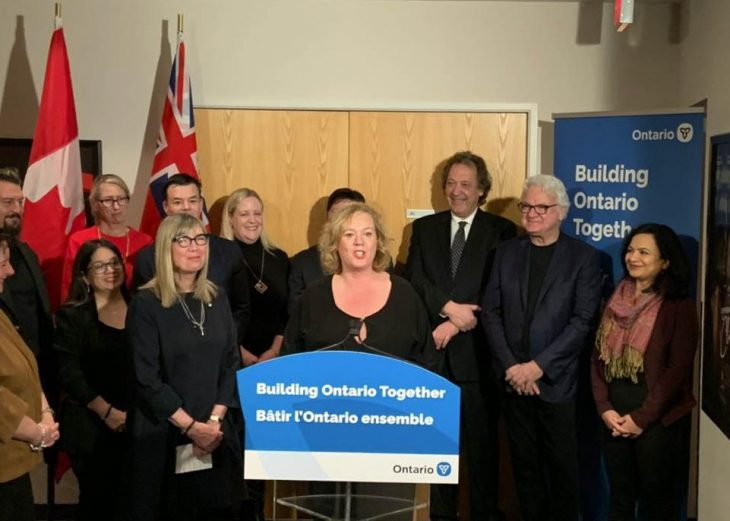
By Etan Vlessing
TORONTO – Whether Ontario content creators should go for the glory of making films or TV shows of their own, or the grind of working for Americans in an expanding service sector, is set to be part of a revealing industry debate kicked off Thursday by Lisa MacLeod, Ontario’s Minister of Heritage, Sport and Tourism.
MacLeod, addressing reporters at Ontario Creates in Toronto, unveiled a 15-member Ontario film and TV advisory panel of industry stakeholders to advise and offer recommendations on how the province can continue to “sustain” its film and television and animation industries.
But as her government looks to spur even greater job creation and economic growth from Ontario’s creative industries, MacLeod pointed to the province’s “spectacular double bottom line” as it looks to attract more foreign film and TV production, while also strengthening “our unique cultural identity” with local Canadian content production.
Ontario’s stark domestic and foreign production divide and the complex puzzle it throws up to policy makers, is only underlined by the composition of the minister’s advisory panel.
The chair is Jim Mirkopolous, VP of Cinespace Film Studios, the studio operator on first-name basis with the physical production heads of major U.S. studios and streamers like Netflix, Hulu and Amazon, and his fellow service sector reps include Wendy Noss, president of the Motion Picture Association-Canada, representing the Hollywood studios, and Take 5 Productions CEO John Weber, who helps manage the CBS Stages Canada studio facility launched in Mississauga, Ontario by media giant ViacomCBS, and with CBS as a long term tenant.
Those representing local content creators on the panel include vice-chair Christina Jennings, CEO of indie producer Shaftesbury, Corrie Coe, senior VP of original programming for Bell Media, and filmmaker reps Marcia Douglas of the Canadian Media Producers Association and Slawko Klymkiw, CEO of the Canadian Film Centre.
Their job on the panel, according to sources, is ensuring MacLeod and her government – as they continue to roll out the red carpet to American players in the name of job creation – keep to their commitment to leverage the province’s fast-growing service sector into sustainable Canadian content production.
And, whether local producers can keep pace with foreign players may well depend on how Ontario’s coming policy battle over its film tax credits plays out.
MacLeod signaled Thursday her government will be examining the province’s approximately $700 million in film and digital tax credits handed out annually – which represents around half of the budget of her ministry – looking for efficiencies.
“We want to make sure we streamline our tax credit system. We want to ensure we continue to support those who are creating growth.” – Minister Lisa MacLeod
“We want to make sure we streamline our tax credit system. We want to ensure we continue to support those who are creating growth,” she said.
That won’t mean cuts to Ontario’s film tax credits, says her ministry. MacLeod instead echoed a September 2018 pledge made to Hollywood players, including Paramount, Disney and NBCUniversal, by then-Ontario Finance Minister Vic Fedeli to reduce red tape and enable the Americans to receive their tax credits faster.
That’s as foreign and mostly Hollywood players continue to cash in with generous tax breaks and currency savings when shooting movies and TV series in Ontario.
However, their presence has also pitted the Americans against local indie producers who have seen greenlights and financing for Canadian TV decline, and their production shoots increasingly leave a crowded Toronto for cheaper soundstages and locations in the rest of the province.
Ontario’s last survey of provincial film and TV expenditures for 2018 pointed to around $1 billion in foreign production spending and nearly $850 million in domestic production spending in the province.
When the 2019 expenditures are released in March, the betting is foreign expenditures last year, which includes substantial visual effects and animation work, will have continued to climb as available local production coin will have shrunk even more.
Evidence film tax credits still grease local and foreign production expenditures in Ontario is seen with MacLeod’s advisory panel also having added Brian O’Leary, SVP, tax counsel for NBC Universal Media, an expert on global film tax incentives for the studio, and David Carter, executive VP of Entertainment Partners, an industry provider of tax incentive services.
Without prejudging the recommendations of her panel, the Ontario heritage minister was careful to signal to local content creators that her province will continue to support them, even as it doubles down on its commitment to Hollywood. “At a time when we’re having conversations about what should be on our screens, I think it’s really important that we continue to support growing and building Canadian content,” she argued.
That said, MacLeod was clear that she wasn’t for Canadianizing made-in-Ontario TV shows, but instead wanted local content producers to sell their wares worldwide.
MacLeod added she also wasn’t for “telling people what they have to watch, but making sure we create the best stories in the world, so that the talent we have in Ontario is exported throughout the world, so people are watching our stories on the screens of their choice,” she said.
And as MacLeod returned to a familiar theme for her government – urging Ontario studio operators to build more soundstages to satisfy seemingly insatiable demand for space by American media giants – the world-facing minister added she wanted the provincial industry to “send a message to the rest of Canada, to Los Angeles and to New York, and the rest of the world that Ontario is open for business, open for jobs and we’re open for artists and we’re open for job-creators.”
Photo borrowed from MacLeod’s Twitter page.


